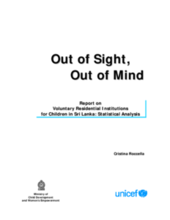In Sri Lanka institutional care has become the sole option for children who do not receive adequate care when the family unit is challenged or destroyed by internal (parental loss or separation, parental conflict) or external (war, disaster and displacement) factors. The recourse to institutional care is frequently practiced to solve family problems not related to parental care. Poverty is also frequently cited as aajor contributory factor.
Most of the residential institutions in Sri Lanka are run by voluntary organizations, officially defined as “voluntary children’s homes”. Residential institutions run by the State are very limited in number, and admit primarily children who have been in contact with the law for various reasons.
The report responds to the need to collect precise quantitative data on voluntary homes for children in Sri Lanka to clarify once and for all how many homes currently operate in the country, and what kind of services they provide to children. It is the first complete baseline study of children caught in the web of institutionalization. The aim was to gather reliable data on the number of voluntary homes operating in Sri Lanka, the status of their registration, and the implementation of minimum quality standards issues by the Department of Probation and Child Care. Basic information on children living in homes at the time of the assessment was also collected: family situation, contacts with next of kin, etc.
The assessment revealed the existence of 488 voluntary children’s homes, hosting around 19,000 children. The study also reveals that the actual causes of institutionalization are wider and more complex than the mere deprivation of parental care or economic factors: several aspects of the lives of children – during crucial years for their development – are negatively affected by the conditions offered in residential homes, despite the best intentions of managers and caregivers.
This report is particularly useful for the definition and implementation of activities in the sector of probation and child care services – in particular those defined within the National Plan of Action for Children in Sri Lanka. It will also serve as a background analysis for the definition of new policies focused on improving the life conditions of children separated from their families, temporarily or permanently.
©Ministry of Child Development and Women's Empowerment

